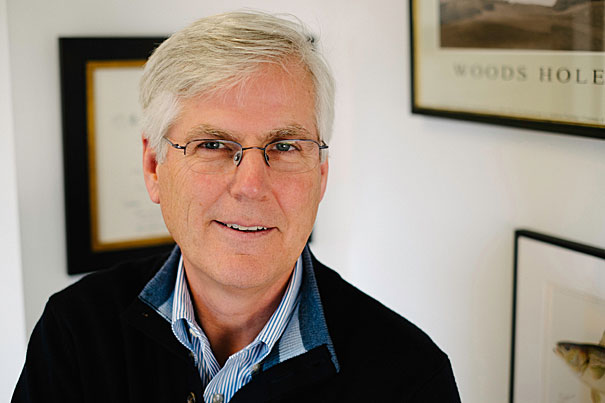Health
-
Lin Test
text with link. This is a quiz. Some text Name Name Quo modo autem philosophus loquitur? Tecum optime, deinde etiam cum mediocri amico. Invidiosum nomen est, infame, suspectum. Name Name…
-

Gender-affirming care is rare, study says
Fewer than 1 in 1,000 transgender youth receive hormones or puberty blockers

-

Nature offers novel approach to oral wound care
Slug’s sticky mucus inspiration behind adhesive hydrogel that can seal wounds in wet environment

-

Time for a rethink of colonoscopy guidelines?
Change informed by new findings would help specialists focus on those most at risk, researcher says

-

Should pharmacists be moral gatekeepers?
‘The problem is not opioids,’ says author of ‘Policing Patients’ — it’s overdose, pain
-

The deadly habit we can’t quite kick
Actions by tobacco companies worry researcher even amid ‘dramatic decrease’ in smoking among young Americans

-
Gut details
New findings have the potential to help researchers more accurately identify microbiome enzymes and quantify their relative abundance.
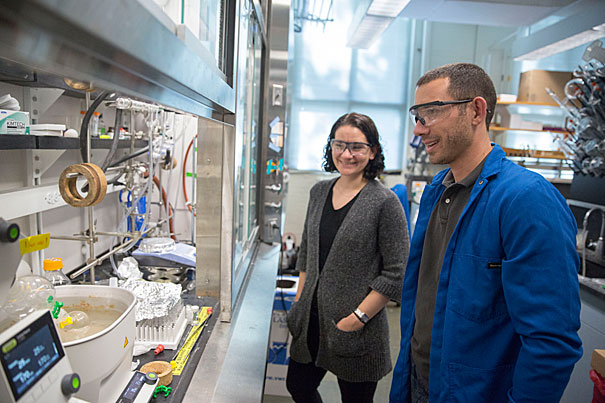
-
Study confirms vitamin D protects against colds and flu
Researchers find vitamin D helps the body fight acute respiratory infection.

-
The confused future of health care
At a Kennedy School panel on the future of health insurance, the analysts disagreed on many key points, but did agree that any new national plan, if there is one, will take time to create.

-
A case against the drug war
Ayelet Waldman stopped at Harvard Law School to talk about her new book, “A Really Good Day: How Microdosing Made a Mega Difference In My Mood, My Marriage, and My Life.”

-
Cocoa for pleasure — and health?
A study by Harvard Medical School faculty members at Brigham and Women’s Hospital is exploring the health benefits of cocoa in a massive, 18,000-person study that may provide answers hinted at in smaller studies.

-
Patients’ cells provide possible treatment for blood disorder
Harvard researchers were able, for the first time, to use patients’ own cells to create cells similar to those in bone marrow, and identify potential treatments for a rare blood disorder.

-
Playing catch-up on marijuana
The Gazette speaks with the Medical School’s Staci Gruber, who thinks that state marijuana legalization policy has run ahead of science.

-
Where lead lurks
A Harvard Chan School researcher has launched a website to connect citizens with data on the water coming through their taps.
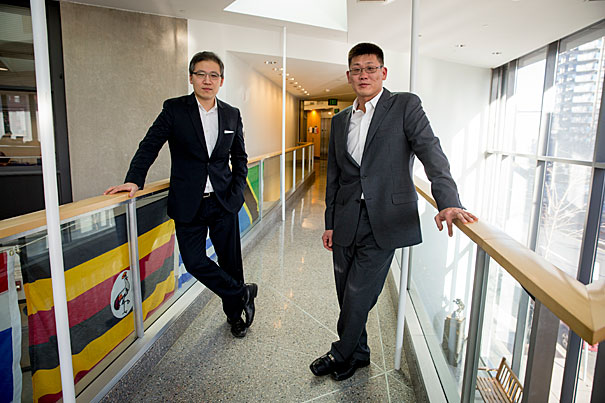
-
New gene-delivery therapy restores partial hearing, balance in deaf mice
Harvard Medical School scientists and colleagues from Massachusetts General Hospital have partly restored hearing in mice with a genetic form of deafness. The new approach overcomes a longstanding barrier to gene therapy for inherited and acquired deafness.

-
New hope for children with brain tumors
A new study out of Harvard-affiliated Dana-Farber/Boston Children’s Cancer and Blood Disorders Center suggests that precision medicine can provide vital care in treatment and diagnosis of pediatric brain tumors.
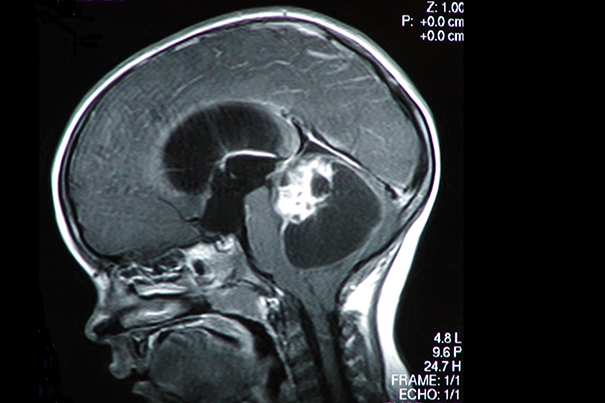
-
Sugar stands accused
Science journalist Gary Taubes brought his “Case Against Sugar” to Harvard Law School.

-
No easy answer for health void in Syria
Professor Jennifer Leaning, co-chair of a new committee set up to examine the health consequences of Syria’s civil war, talks about the country’s prospects for stability and recovery.
-
Spotting speedy brain activity
Using ultra-fast MRI scans, scientists are able to track rapid oscillations in brain activity that previously would have gone undetected, a development that could open the door to understanding fast-occurring cognitive processes that once appeared off-limits to scientists.
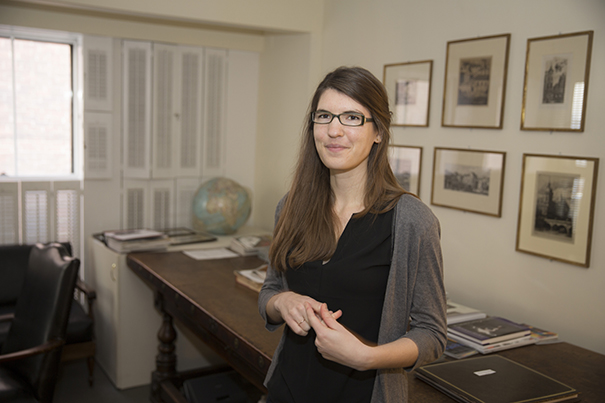
-
Love interrupted
A new study by researchers at Beth Israel Deaconess Medical Center examines the neuroanatomy behind delusional misidentification syndromes.

-
Topical treatment clears precancerous skin lesions
Harvard researchers at Massachusetts General Hospital have found a topical chemotherapy and an immune-system-activating compound that is able to rapidly clear actinic keratosis lesions from patients participating in a clinical trial.

-
Better days for Boston cyclists
Boston has become a safer place for bicyclists as it has improved its infrastructure, a new study from the Harvard T.H. Chan School of Public Health says, with the chances of being injured in a bicycle accident falling 14 percent a year between 2009 and 2012.

-
Longer use of pain relievers tied to hearing loss in women
A Harvard study has found that women who used ibuprofen or acetaminophen for six years or more were at higher risk of hearing loss than those who used these medications for a year or less.

-
How power of positive thinking works
A Harvard study shows that although an optimistic outlook may help women live longer, one other possibility is that higher optimism directly impacts our biological systems.

-
Fresh ways to fight cancer
Cancer patients have new weapons on their side, provided by targeted drug therapy and, more recently, immune therapy. Now, the recent discovery of large numbers of noncoding RNA that are active in disease provides a new opportunity to both understand and fight cancer, according to Pier Paolo Pandolfi, professor at Harvard Medical School and director of the Cancer Center and Cancer Research Institute at Beth Israel Deaconess Medical Center.
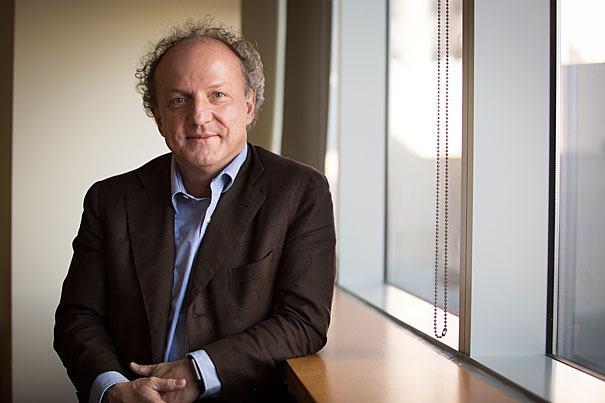
-
Can happiness lead toward health?
A new Harvard center on health and happiness had its academic coming-out party Friday, hosting a daylong symposium that highlighted what science does and doesn’t say about the interaction of health and happiness, and identifying pathways where investigators should probe next.
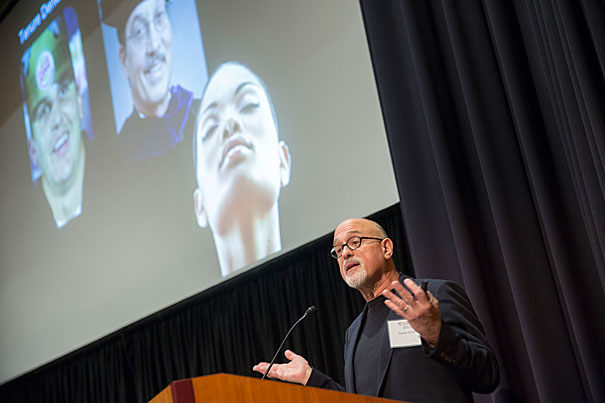
-
Hunger for change
A panel sponsored by the Harvard Law School’s Food Law and Policy Clinic and the Union of Concerned Scientists brought food luminaries to talk about the need for a national food policy.
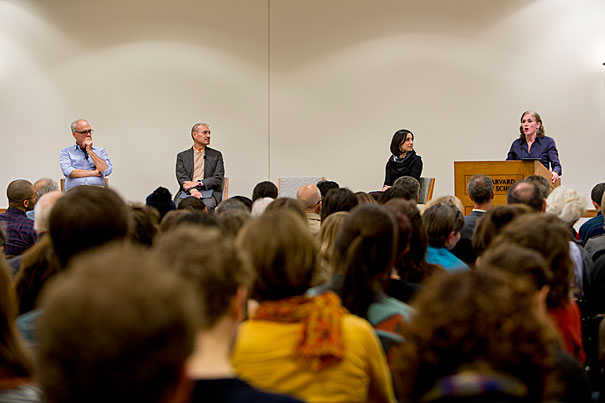
-
How Zika infects the growing brain
Studies have suggested that the Zika virus enters neural progenitor cells by grabbing onto a specific protein called AXL on the cell surface. Now, scientists at the Harvard Stem Cell Institute and Novartis have shown that this is not the only route of infection. The scientists demonstrated that Zika infected neural progenitor cells even when the cells did not produce the AXL protein.
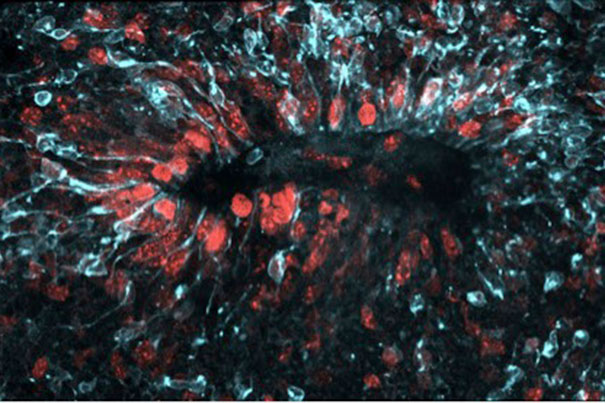
-
Colorful clones track stem cells
Harvard Stem Cell Institute researchers have used a colorful cell-labeling technique to track the development of the blood system and trace the lineage of an adult blood cell traveling through the vast networks of veins, arteries, and capillaries back to its parent stem cell in the marrow.

-
A hydrogel that helps stop uncontrolled bleeding
Harvard researchers have developed a hydrogel that can be easily injected into blood vessels, helping to stop uncontrolled bleeding even in patients on blood-thinners or with bleeding disorders.
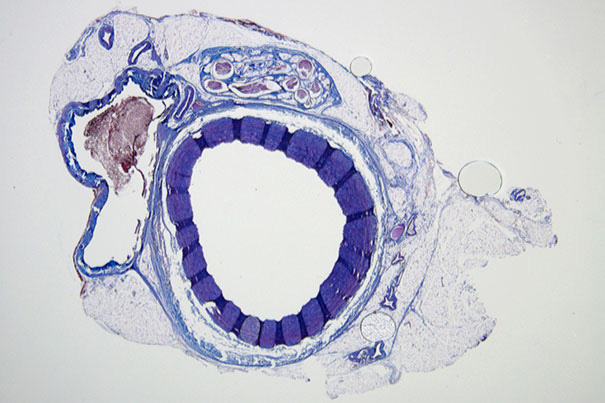
-
Updating embryo research guidelines
Scientists and ethicists gathered at Harvard Law School to discuss the ethics of human embryo experimentation and whether a two-week developmental time limit on their use is appropriate any longer.
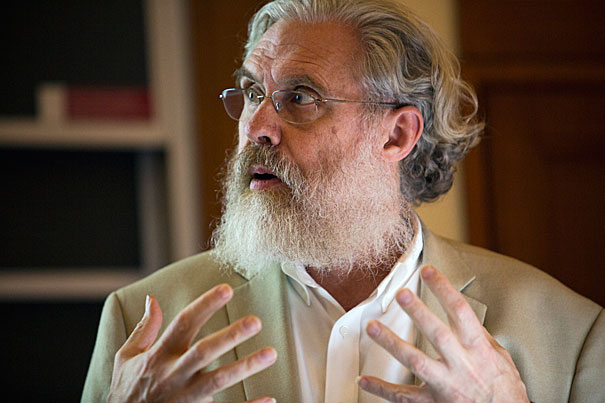
-
What do we know about suicide? Not nearly enough
Despite decades of research aimed at understanding suicide, scientists are no better at predicting self-harm than they were a half-century ago.

-
In lost toes, a stirring Shackleton subplot
New research highlights the skill and poise of doctors who tended to stranded crewmen in the famed Shackleton saga.
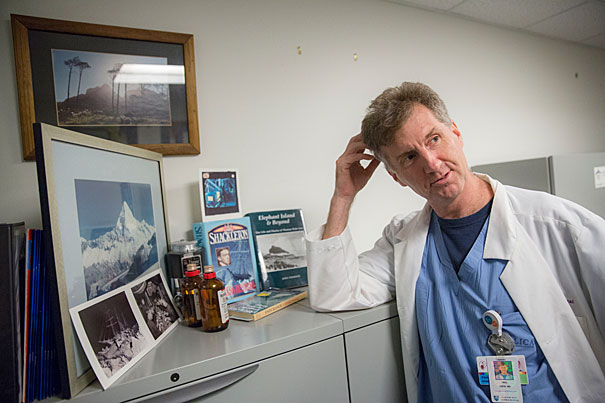
-
Science of stripes
Scientists have shown that to interrupt the development of pigment cells that form their stripes, African striped mice and chipmunks both use a gene that until now had been associated primarily with cranio-facial development.

-
Recommendations to aid NFL players’ health
A new Harvard report addresses legal and ethical factors affecting the health of players in the National Football League, and makes recommendations to improve it.

-
Tackling blood diseases, immune disorders
Startup Magenta Therapeutics licenses technologies from Harvard, Massachusetts General Hospital, and Boston Children’s Hospital that could help transform treatment.
